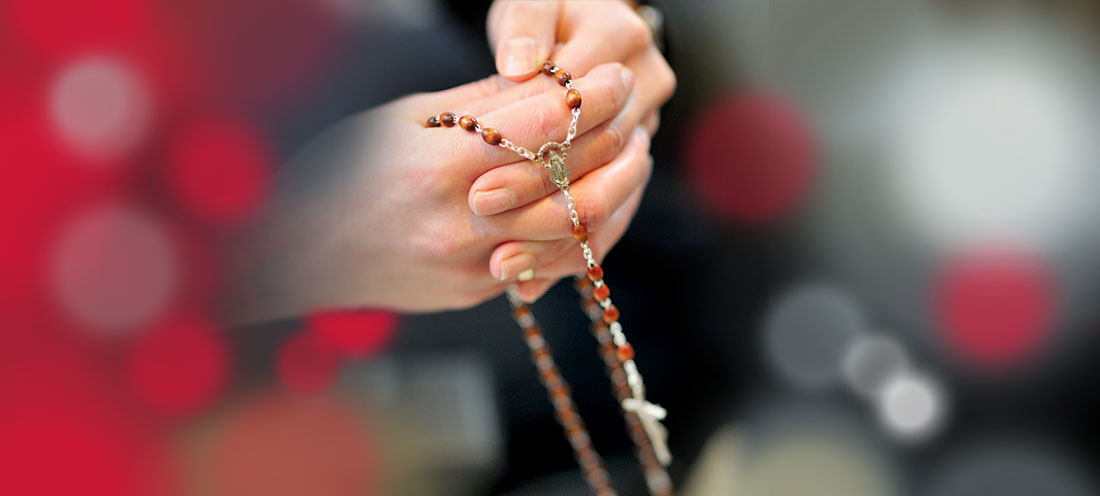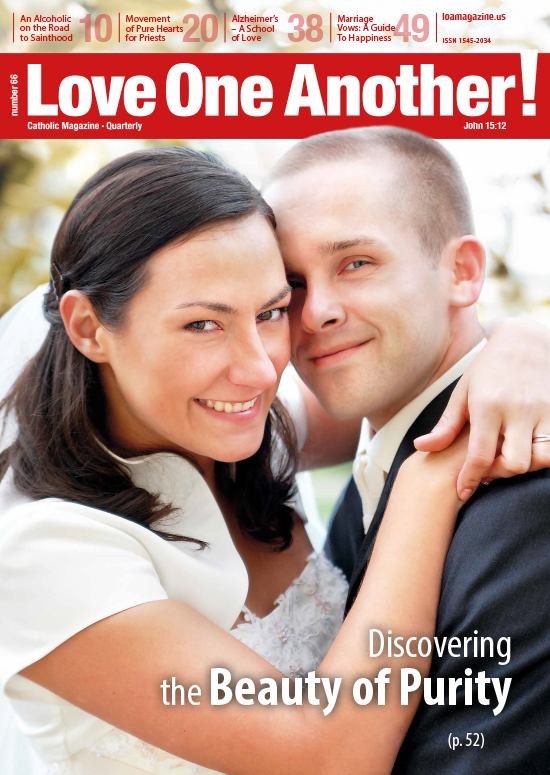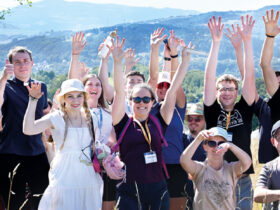“If you do not stand firm in your faith, you will not stand at all” (Isa. 7:9)

We know that in the heart of every man there is a deep-rooted yearning for love and never-ending happiness. Through this yearning, the loving God calls on us to strive with all our might for perfect happiness or unite with him in love.
The road to the unity of man with God is the road of faith, which will end at the moment of death. In this most important moment of our earthly life, our fate will be sealed for eternity: we will be either saved or damned. “Do not be deceived: God cannot be mocked. A man reaps what he sows. Whoever sows to please their flesh, from the flesh will reap destruction; whoever sows to please the Spirit, from the Spirit will reap eternal life” (Gal. 6:7-8).
The road to perfect happiness is the difficult road of faith, which inevitably involves making one’s way through the darkness of the senses and spirit. One of the greatest Christian mystics, St John of the Cross, writes:
“[…] we must believe in His being, which is not perceptible to the understanding, neither to the desire nor to the imagination nor to any other sense, neither can it be known in this life at all. Yea, in this life, the highest thing that can be felt and experienced concerning God is infinitely remote from God and from the pure possession of Him”.
The only sensible aim of our life on earth should be striving with all our might to unite with God, who cannot be grasped with the mind or the human heart and who seems absent from the dimensions of human experience. Persevering along the road of faith, we acquire knowledge surpassing any cognition and wisdom. Hence God warns: “If you do not stand firm in your faith, you will not stand at all” (Isa. 7:9). The famous philosopher St Edith Stein, who abandoned atheism after reading the biography of St Teresa of Avila, issues this call:
“[…] for us to declare for or against God. This is required of us: make up our minds, without receiving any guarantee. That is the great risk of faith. The road leads from believing to seeing, not the other way round. He who is too proud to squeeze through this narrow gate remains outside. Yet he who crosses to the other side while alive reaches ever fuller clarity and experiences the truth of the saying Credo tu intelligam – I believe and comprehend. I think that little can be achieved in this respect through experiences that are faked and constructed in one’s imagination”.
To believe means to cling in prayer to Jesus, by the decision of one’s will, overcoming all one’s accumulated aversion and prejudice, and with childlike trust to entrust him with the whole burden of one’s sins and inner pain, in the sacrament of penance, daily prayer and the Eucharist. St Peter advises: “Cast all your anxiety on him because he cares for you” (1 Pet. 5:7).
Each manifestation of disbelief and distrust causes great suffering to Jesus. Christ confided to St Faustina: “How painfully distrust of My goodness wounds Me! Sins of distrust wound Me most painfully (Diary 1076). Distrust on the part of souls is tearing at My insides. […] despite My inexhaustible love for them they do not trust Me. Even My death is not enough for them (50). […] God though I am, I cannot help such a soul because it scorns Me” (580).
At the very beginning of our road of faith, we must voluntarily renounce the desire of things and the pleasures of this world. In our attitude to the sensorially cognisable world, in work and rest, in eating and dressing, in entertainment and play, the words of Jesus should be remembered: “So therefore, none of you can become my disciple if you do not give up all your possessions” (Luke 14:33). The struggle against all covetousness, which enslaves and deprives one of God’s Spirit, means undertaking to carry one’s cross and entering the dark night of faith. Only then does the painful process begin whereby man is cleansed, transformed and united with God through love. All this is done with our complete agreement and consent through Christ in the power of the Holy Spirit.
To all those who resolve to proceed along the dark road of faith, St John of the Cross gives a few very concise counsels:
“First, let him have an habitual desire to imitate Christ in everything that he does, conforming himself to His life; upon which life he must meditate so that he may know how to imitate it, and to behave in all things as Christ would behave. Secondly, in order that he may be able to do this well, every pleasure that presents itself to the senses, if it be not purely for the honor and glory of God, must be renounced and completely rejected for the love of Jesus Christ, Who in this life had no other pleasure, neither desired any, than to do the will of His Father, which He called His meat and food (John 4:34). I take this example. If there present itself to a man the pleasure of listening to things that tend not to the service and honor of God, let him not desire that pleasure, nor desire to listen to them; […] And similarly with respect to all the senses, in so far as he can fairly avoid the pleasure in question; if he cannot, it suffices that, although these things may be present to his senses, he desires not to have this pleasure. And in this wise he will be able to mortify and void his senses of such pleasure, as though they were in darkness. If he takes care to do this, he will soon reap great profit”.
Proceeding along the road of the dark night of faith is a painful process of cleansing and maturing towards love.
“[…] until the Lord shall have completely purged it – St John of the Cross writes – after the manner that He wills, no means or remedy is of any service or profit for the relief of its affliction; the more so because the soul is as powerless in this case as one who has been imprisoned in a dark dungeon, and is bound hand and foot, and can neither move nor see, nor feel any favor whether from above or from below, until the spirit
is humbled, softened and purified, and grows so keen and delicate and pure that it can become one with the Spirit of God, according to the degree of union of love which His mercy is pleased to grant it; […] When the soul casts away all that is against God’s will, it is changed into God through love”.
Practical directions for everyday procession along the road of faith
Our Lady, worried about the eternal salvation of all people, engulfs us with her motherly love and appears in various places around the globe, such as Lourdes, Fatima and Medjugorje, calling upon mankind to convert and take the road leading to the home of the Father, giving very practical and simple directions:
“I came to tell the world: God is the Truth; he does exist. In him, there is true happiness, fullness of life and the true joy that brings peace. All I ask of you is conversion […] That is my wish and request: hurry to convert! You who believe, change and deepen your faith. The world lives in sin. If it continues like that, it will meet a tragic end […] Convert without delay!”
What should one do to proceed along the road of faith every day despite the dark night of the senses and spirit?
1. First and foremost, pray every day. Neglecting prayer, one loses faith, and anyone who does not pray becomes in fact an atheist. Our Lady insists particularly on constancy and perseverance in prayer.
“I ask you, dear children, to make prayer the top priority in your life, to start and end each day with prayer. May saying the rosary every day be a duty that you gladly fulfil. Without prayer, dear children, you cannot feel God or me or the love I give you. I call upon you, therefore, to start and end each day with prayer. Prayer and fasting may prevent even war”.
To proceed along the road of faith, read the Holy Scriptures every day. By reading the Holy Scriptures, which are the living words of God, we may live in the truth which liberates, revives and sanctifies.
2. To proceed along the road of faith, renounce, once and for all, any attachment and habituation to sin. Pray for aversion to and loathing for sin, because it results in the loss of eternal life. You must come to loathe and cast aside sins of unchastity of all kinds, such as pre- and extramarital sex, watching pornography, masturbation, using contraceptives and any other acts and attitudes against the dignity of a human person and the sanctity of life.
Besides prayer, perseverance in fasting is also particularly helpful. Our Lady says:
“Satan rages at those who fast and convert […] For those whose age, health and work permit it, it is best to fast on bread and water on Wednesdays and Fridays. But fasting should not be only about food. Fasting is supposed to reflect the truth that man needs God to be happy. Fasting is giving up all sins, rejecting alcohol, cigarettes and various other stimulants, and not watching TV programmes, because they pose a great danger to you and your families; after watching them, you are not able to pray. These restrictions can be introduced by all of you”.
3. Setting out on the road of faith, you must take special care to be in the state of sanctifying grace at all times. After every grave fall, you must immediately go to confession. When there are no mortal sins, confess every month to immerse your heart, wounded by sin, in the ocean of God’s mercy. It is highly recommended to have a regular confessor and spiritual leader.
4. On our road to heaven, we should receive Jesus in Holy Communion and adore him in the Blessed Sacrament as often as possible.
Our Lady says: “I want you to be aware that it is Jesus Himself who offers Himself to you during Holy Mass. Look forward to this moment. You will never completely grasp God’s love present in the Eucharist. You will never be able to give proper thanks for this gift. Those who come to church unprepared, without faith, without intending to receive Holy Communion and without thanksgiving harden their hearts still more”.
Jesus is really present in the Blessed Sacrament, and that is why we should come to him and maintain in his presence an attitude of adoration.
“The Lord is present in the tabernacle with his divinity and humanity; not because of Himself, but because of us! He also knows that we – such as we are – need His personal closeness. Consequently, any person in his or her right mind and possessing proper feelings is drawn to be there as often and as long as they can. To be able to forget about oneself, renounce all personal desires and rights, have a heart open to any pains and needs of others – that is the ideal which is achievable only thanks to everyday close communion with the Saviour in the tabernacle. He who visits Him in the Eucharist and discusses with Him all kinds of situations he is in, he who allows himself to be cleansed by the sanctifying power of the altar and offers himself to Him in Christ’s sacrifice, he who receives Him into his soul in Holy Communion immerses himself ever more deeply and strongly in the stream of divine life and grows into the Mystical Body of Christ, shaping his heart in imitation of God’s heart” (St Edith Stein).
Undertaking the everyday effort of proceeding along the road of faith, which is a fascinating adventure and a spiritual ascent to the pinnacle of happiness whose name is God–Love, we ought to remember what the master of mystical life St John of the Cross wrote: “In order to arrive at that which thou knowest not, Thou must go by a way that thou knowest not. In order to arrive at that which thou possessest not, Thou must go by a way that thou possessest not. In order to arrive at that which thou art not, Thou must go through that which thou art not.”






